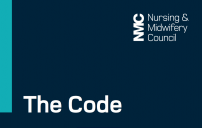The best nursing care comes through creativity and innovation, adapting care to the needs of the individual patient, rather than cramming each person into a ‘cookie cutter care plan’. But there is more than a hint of nanny-state micromanagement in new nursing guidelines that came into effect this week.
The new NMC Code came into effect on 31 March 2015. This is the first full revision on the code of professional conduct for nurses and midwives since 2008, and has gone out to an extensive consultation process.
In large part this is a direct response to some quite stinging criticism of the Nursing and Midwifery Council and the caring professions in general in the Francis Report in Feb 2012. So, in come some markedly new elements, including a duty of candour (truth telling and openness with patients about problems with their care, including errors) and increased duties to ‘blow the whistle’ on bad practice and unacceptable standards in the clinical environment.
These duties both make sense, but are only effective if they are backed up by support systems that do not penalise nurses and midwives for being truthful or raising concerns – and as we know from bitter experience, many NHS whistleblowers suffer badly for standing up for the truth.
There are also some sensible guidelines on the use of social media – something that was only just emerging as an issue in 2008. We now see everyone micro-blogging every aspect of their lives, in a way that blurs many traditional boundaries.
I have already blogged about a poorly thought through guideline on conscientious objection (to my mind, guidance on the appropriate exercise of freedom of conscience would have been far more helpful, rather than couching it in negative and restrictive terms around ‘objection’).
Also problematic are some guidelines on the fundamentals of nursing care, which I and many others have found somewhat patronising (good hydration and nutrition are so fundamental to nursing care that they should go without saying!). Is this a realisation that nothing can be taken for granted any more, and that even the most basic aspects of the profession have to be laid out again in writing? Or is it, even more worryingly, a tendency towards nanny-state micromanagement of clinical care – hemming professionals in with ever more restrictive protocols, targets and guidelines to the extent that there is virtually no room for individual professional judgement. Just a ‘box-ticking’ following of pre-set procedures and processes?
However you see these new areas in the Code, there is no doubting the intention to make them known to the wider NHS and general public. Our care should be open and accountable, and should adhere to the highest possible standards. The horrors of the Mid Staffs scandal should never be repeated. This Code should help increase the accountability all professionals and employers have for maintaining the best standards. But the degree of control and ‘hemming in’ that also seems to be part of this is stifling. The best nursing care comes through creativity and innovation, adapting care to the needs of the individual patient, rather than cramming each person into a ‘cookie cutter care plan’.
Just this last week at the annual Symposium of Parish Nursing Ministries UK we heard several moving presentations on innovative, patient centred models of care for people with dementia. They included two plenaries from John Swinton on the theology of the personhood of people with dementia, and how that spiritual understanding shapes care. So much care is driven by a belief that we can do nothing for those living with this awful range of conditions, that their selves have been lost and that all that we can do is feed them and keep them safe. The danger with prescriptive guidelines is that they lead us down this line of least resistance, rather than encouraging creative, individualised care, especially for those that society deems as being no longer persons.
It is a fine line to tread between good standards and constrictive, overly protocol driven practice. It remains to be seen if these new standards achieve this balancing act. But for all those nurses who genuinely care for patients as people, innovation, compassion and person centeredness have always been the focus of how they deliver care.
A Christian theology of the value and dignity of human personhood reinforces such an approach to care. Let us hope that this approach does not become one that is inadvertently penalised in this new, prescriptive professional environment!




